Strategic Quality and System Management: Construction Project Analysis
VerifiedAdded on 2023/01/16
|63
|19597
|59
Report
AI Summary
This report critically analyzes the impact of digitalization on quality management in construction projects, focusing on the case of The Green Planet construction company in Dubai. It explores the importance of quality management, evaluates various digital tools, and identifies challenges in implementation, such as resistance to change and high implementation costs. The study employs a mixed-method approach, examining the benefits of digitalization, including improved information flow, time and material savings, and reduced hazardous chemicals. It also highlights the need for skilled labor, legal compliance, and stakeholder collaboration. The report recommends strategies like IT professional recruitment, software implementation with legal permissions, training, and financial resource allocation. The findings underscore digitalization's role in enhancing construction quality, competitiveness, and operational efficiency, offering valuable insights for construction companies aiming to integrate digital technologies.
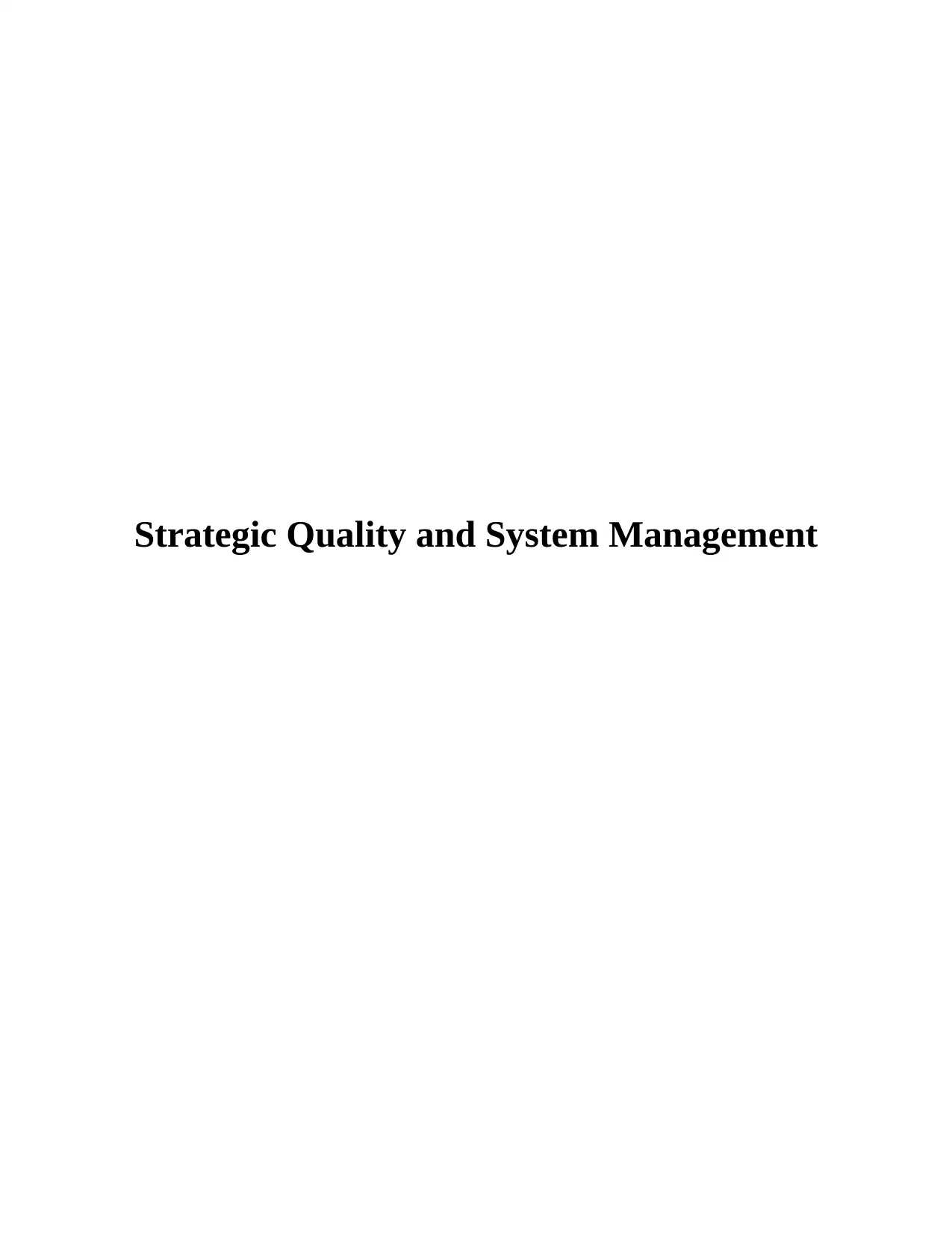
Strategic Quality and System Management
Paraphrase This Document
Need a fresh take? Get an instant paraphrase of this document with our AI Paraphraser
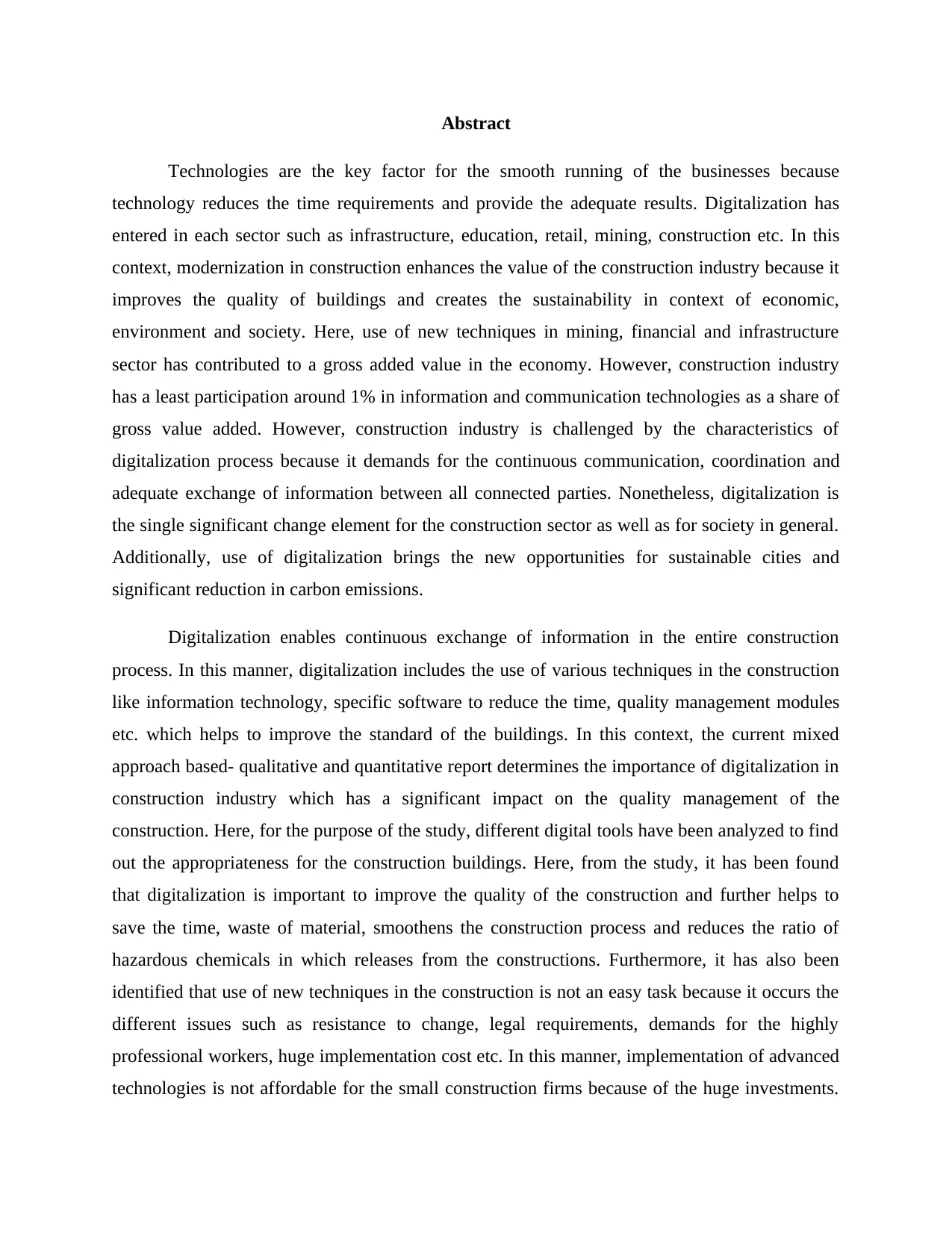
Abstract
Technologies are the key factor for the smooth running of the businesses because
technology reduces the time requirements and provide the adequate results. Digitalization has
entered in each sector such as infrastructure, education, retail, mining, construction etc. In this
context, modernization in construction enhances the value of the construction industry because it
improves the quality of buildings and creates the sustainability in context of economic,
environment and society. Here, use of new techniques in mining, financial and infrastructure
sector has contributed to a gross added value in the economy. However, construction industry
has a least participation around 1% in information and communication technologies as a share of
gross value added. However, construction industry is challenged by the characteristics of
digitalization process because it demands for the continuous communication, coordination and
adequate exchange of information between all connected parties. Nonetheless, digitalization is
the single significant change element for the construction sector as well as for society in general.
Additionally, use of digitalization brings the new opportunities for sustainable cities and
significant reduction in carbon emissions.
Digitalization enables continuous exchange of information in the entire construction
process. In this manner, digitalization includes the use of various techniques in the construction
like information technology, specific software to reduce the time, quality management modules
etc. which helps to improve the standard of the buildings. In this context, the current mixed
approach based- qualitative and quantitative report determines the importance of digitalization in
construction industry which has a significant impact on the quality management of the
construction. Here, for the purpose of the study, different digital tools have been analyzed to find
out the appropriateness for the construction buildings. Here, from the study, it has been found
that digitalization is important to improve the quality of the construction and further helps to
save the time, waste of material, smoothens the construction process and reduces the ratio of
hazardous chemicals in which releases from the constructions. Furthermore, it has also been
identified that use of new techniques in the construction is not an easy task because it occurs the
different issues such as resistance to change, legal requirements, demands for the highly
professional workers, huge implementation cost etc. In this manner, implementation of advanced
technologies is not affordable for the small construction firms because of the huge investments.
Technologies are the key factor for the smooth running of the businesses because
technology reduces the time requirements and provide the adequate results. Digitalization has
entered in each sector such as infrastructure, education, retail, mining, construction etc. In this
context, modernization in construction enhances the value of the construction industry because it
improves the quality of buildings and creates the sustainability in context of economic,
environment and society. Here, use of new techniques in mining, financial and infrastructure
sector has contributed to a gross added value in the economy. However, construction industry
has a least participation around 1% in information and communication technologies as a share of
gross value added. However, construction industry is challenged by the characteristics of
digitalization process because it demands for the continuous communication, coordination and
adequate exchange of information between all connected parties. Nonetheless, digitalization is
the single significant change element for the construction sector as well as for society in general.
Additionally, use of digitalization brings the new opportunities for sustainable cities and
significant reduction in carbon emissions.
Digitalization enables continuous exchange of information in the entire construction
process. In this manner, digitalization includes the use of various techniques in the construction
like information technology, specific software to reduce the time, quality management modules
etc. which helps to improve the standard of the buildings. In this context, the current mixed
approach based- qualitative and quantitative report determines the importance of digitalization in
construction industry which has a significant impact on the quality management of the
construction. Here, for the purpose of the study, different digital tools have been analyzed to find
out the appropriateness for the construction buildings. Here, from the study, it has been found
that digitalization is important to improve the quality of the construction and further helps to
save the time, waste of material, smoothens the construction process and reduces the ratio of
hazardous chemicals in which releases from the constructions. Furthermore, it has also been
identified that use of new techniques in the construction is not an easy task because it occurs the
different issues such as resistance to change, legal requirements, demands for the highly
professional workers, huge implementation cost etc. In this manner, implementation of advanced
technologies is not affordable for the small construction firms because of the huge investments.
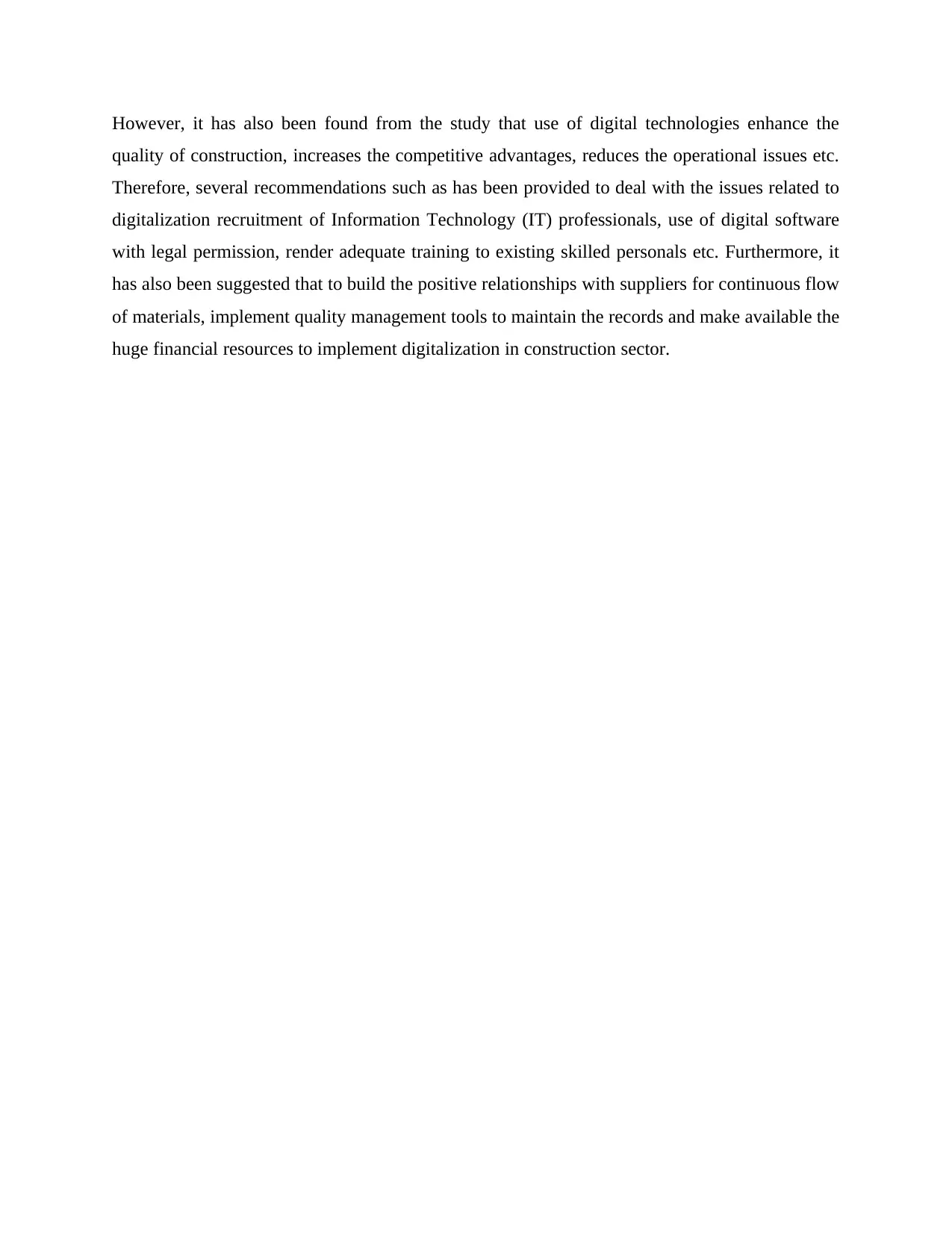
However, it has also been found from the study that use of digital technologies enhance the
quality of construction, increases the competitive advantages, reduces the operational issues etc.
Therefore, several recommendations such as has been provided to deal with the issues related to
digitalization recruitment of Information Technology (IT) professionals, use of digital software
with legal permission, render adequate training to existing skilled personals etc. Furthermore, it
has also been suggested that to build the positive relationships with suppliers for continuous flow
of materials, implement quality management tools to maintain the records and make available the
huge financial resources to implement digitalization in construction sector.
quality of construction, increases the competitive advantages, reduces the operational issues etc.
Therefore, several recommendations such as has been provided to deal with the issues related to
digitalization recruitment of Information Technology (IT) professionals, use of digital software
with legal permission, render adequate training to existing skilled personals etc. Furthermore, it
has also been suggested that to build the positive relationships with suppliers for continuous flow
of materials, implement quality management tools to maintain the records and make available the
huge financial resources to implement digitalization in construction sector.
⊘ This is a preview!⊘
Do you want full access?
Subscribe today to unlock all pages.

Trusted by 1+ million students worldwide
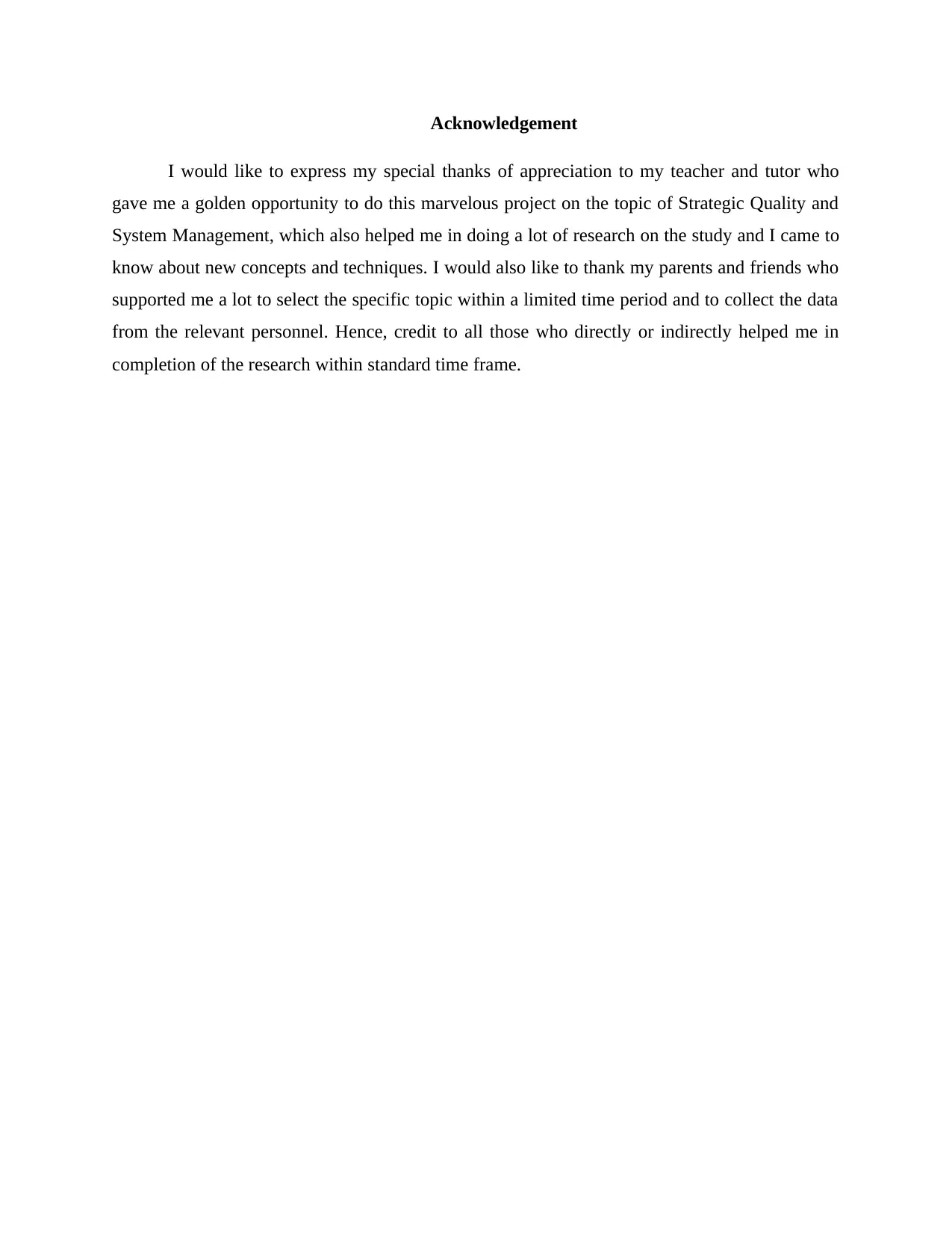
Acknowledgement
I would like to express my special thanks of appreciation to my teacher and tutor who
gave me a golden opportunity to do this marvelous project on the topic of Strategic Quality and
System Management, which also helped me in doing a lot of research on the study and I came to
know about new concepts and techniques. I would also like to thank my parents and friends who
supported me a lot to select the specific topic within a limited time period and to collect the data
from the relevant personnel. Hence, credit to all those who directly or indirectly helped me in
completion of the research within standard time frame.
I would like to express my special thanks of appreciation to my teacher and tutor who
gave me a golden opportunity to do this marvelous project on the topic of Strategic Quality and
System Management, which also helped me in doing a lot of research on the study and I came to
know about new concepts and techniques. I would also like to thank my parents and friends who
supported me a lot to select the specific topic within a limited time period and to collect the data
from the relevant personnel. Hence, credit to all those who directly or indirectly helped me in
completion of the research within standard time frame.
Paraphrase This Document
Need a fresh take? Get an instant paraphrase of this document with our AI Paraphraser
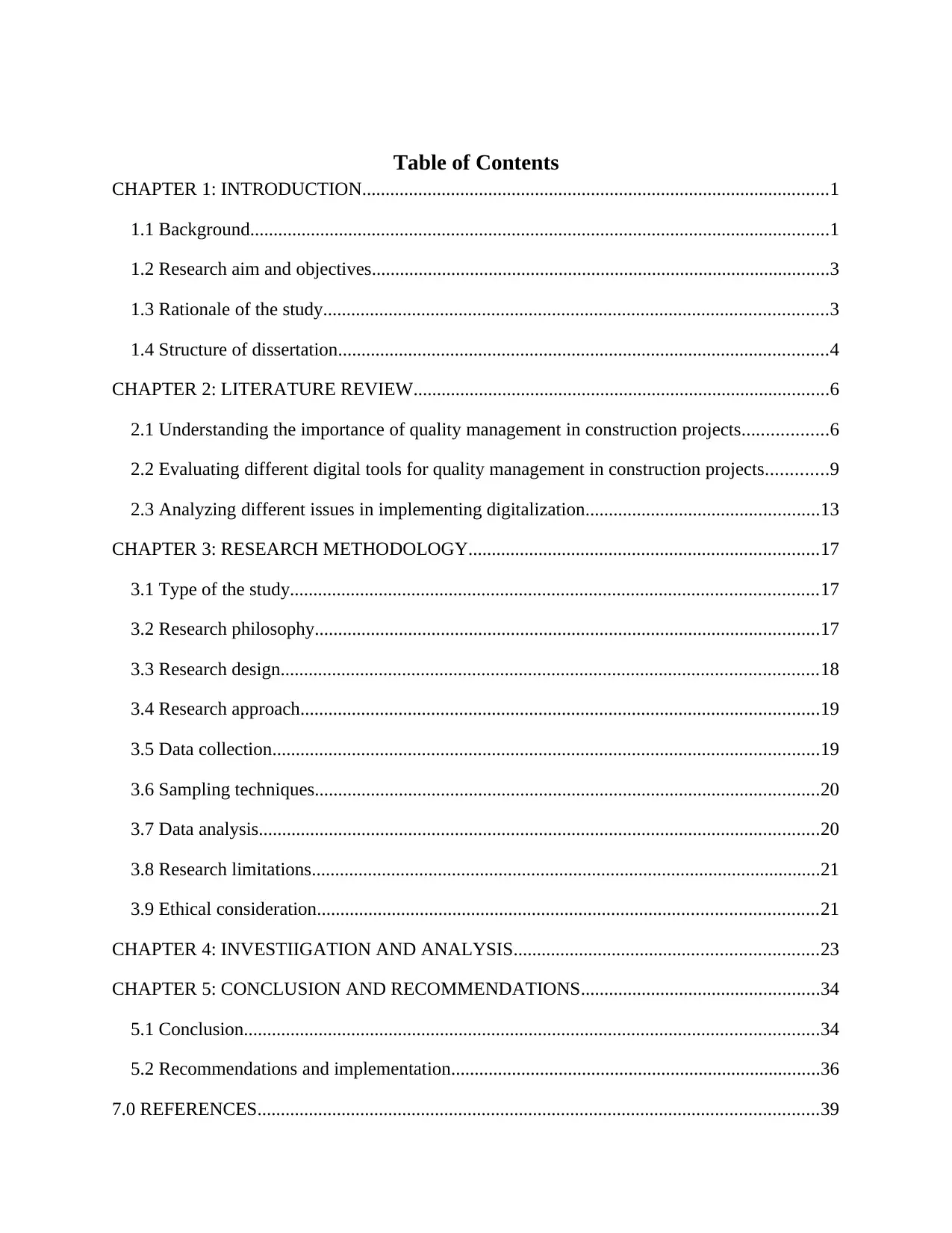
Table of Contents
CHAPTER 1: INTRODUCTION....................................................................................................1
1.1 Background............................................................................................................................1
1.2 Research aim and objectives..................................................................................................3
1.3 Rationale of the study............................................................................................................3
1.4 Structure of dissertation.........................................................................................................4
CHAPTER 2: LITERATURE REVIEW.........................................................................................6
2.1 Understanding the importance of quality management in construction projects..................6
2.2 Evaluating different digital tools for quality management in construction projects.............9
2.3 Analyzing different issues in implementing digitalization..................................................13
CHAPTER 3: RESEARCH METHODOLOGY...........................................................................17
3.1 Type of the study.................................................................................................................17
3.2 Research philosophy............................................................................................................17
3.3 Research design...................................................................................................................18
3.4 Research approach...............................................................................................................19
3.5 Data collection.....................................................................................................................19
3.6 Sampling techniques............................................................................................................20
3.7 Data analysis........................................................................................................................20
3.8 Research limitations.............................................................................................................21
3.9 Ethical consideration...........................................................................................................21
CHAPTER 4: INVESTIIGATION AND ANALYSIS.................................................................23
CHAPTER 5: CONCLUSION AND RECOMMENDATIONS...................................................34
5.1 Conclusion...........................................................................................................................34
5.2 Recommendations and implementation...............................................................................36
7.0 REFERENCES........................................................................................................................39
CHAPTER 1: INTRODUCTION....................................................................................................1
1.1 Background............................................................................................................................1
1.2 Research aim and objectives..................................................................................................3
1.3 Rationale of the study............................................................................................................3
1.4 Structure of dissertation.........................................................................................................4
CHAPTER 2: LITERATURE REVIEW.........................................................................................6
2.1 Understanding the importance of quality management in construction projects..................6
2.2 Evaluating different digital tools for quality management in construction projects.............9
2.3 Analyzing different issues in implementing digitalization..................................................13
CHAPTER 3: RESEARCH METHODOLOGY...........................................................................17
3.1 Type of the study.................................................................................................................17
3.2 Research philosophy............................................................................................................17
3.3 Research design...................................................................................................................18
3.4 Research approach...............................................................................................................19
3.5 Data collection.....................................................................................................................19
3.6 Sampling techniques............................................................................................................20
3.7 Data analysis........................................................................................................................20
3.8 Research limitations.............................................................................................................21
3.9 Ethical consideration...........................................................................................................21
CHAPTER 4: INVESTIIGATION AND ANALYSIS.................................................................23
CHAPTER 5: CONCLUSION AND RECOMMENDATIONS...................................................34
5.1 Conclusion...........................................................................................................................34
5.2 Recommendations and implementation...............................................................................36
7.0 REFERENCES........................................................................................................................39
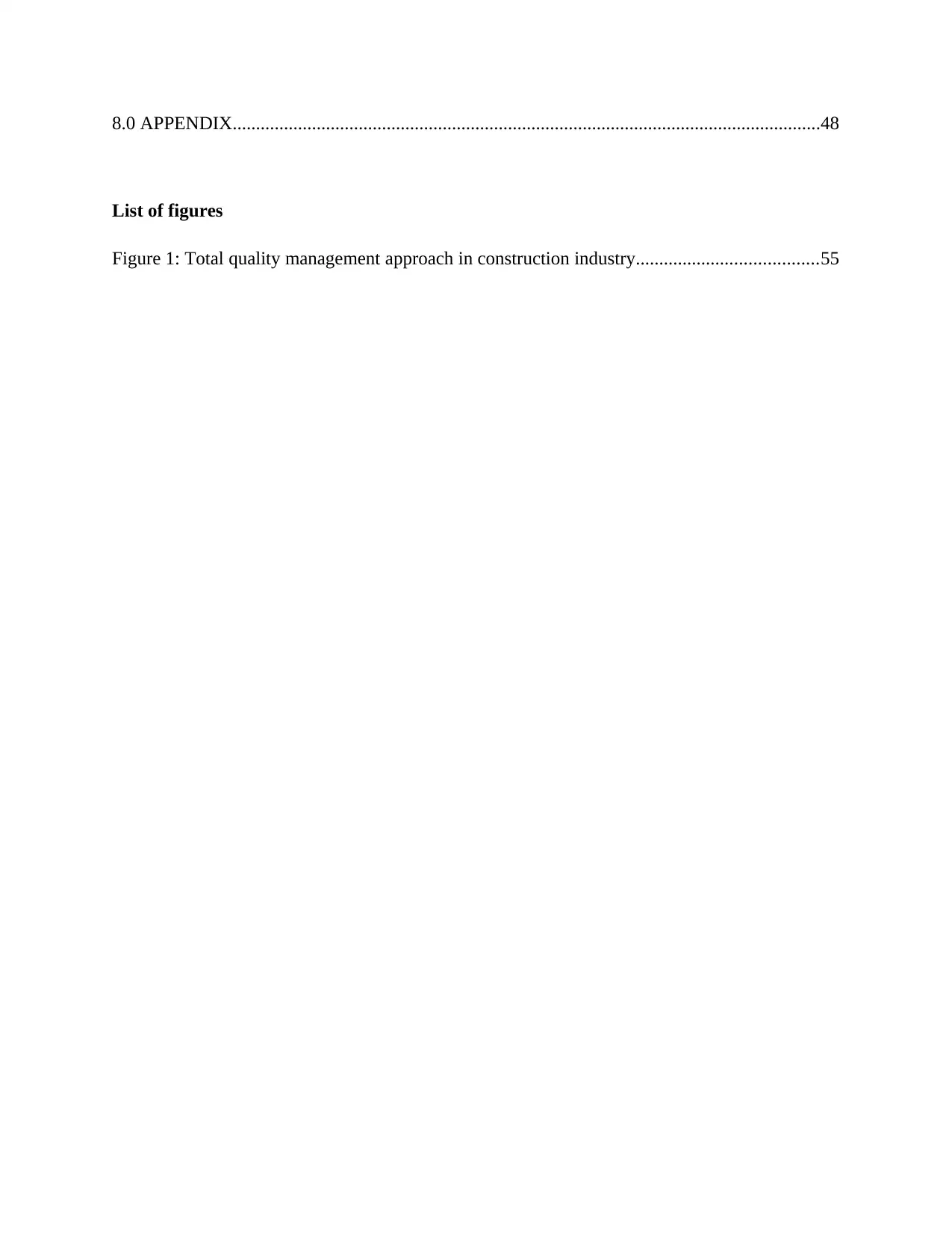
8.0 APPENDIX..............................................................................................................................48
List of figures
Figure 1: Total quality management approach in construction industry.......................................55
List of figures
Figure 1: Total quality management approach in construction industry.......................................55
⊘ This is a preview!⊘
Do you want full access?
Subscribe today to unlock all pages.

Trusted by 1+ million students worldwide
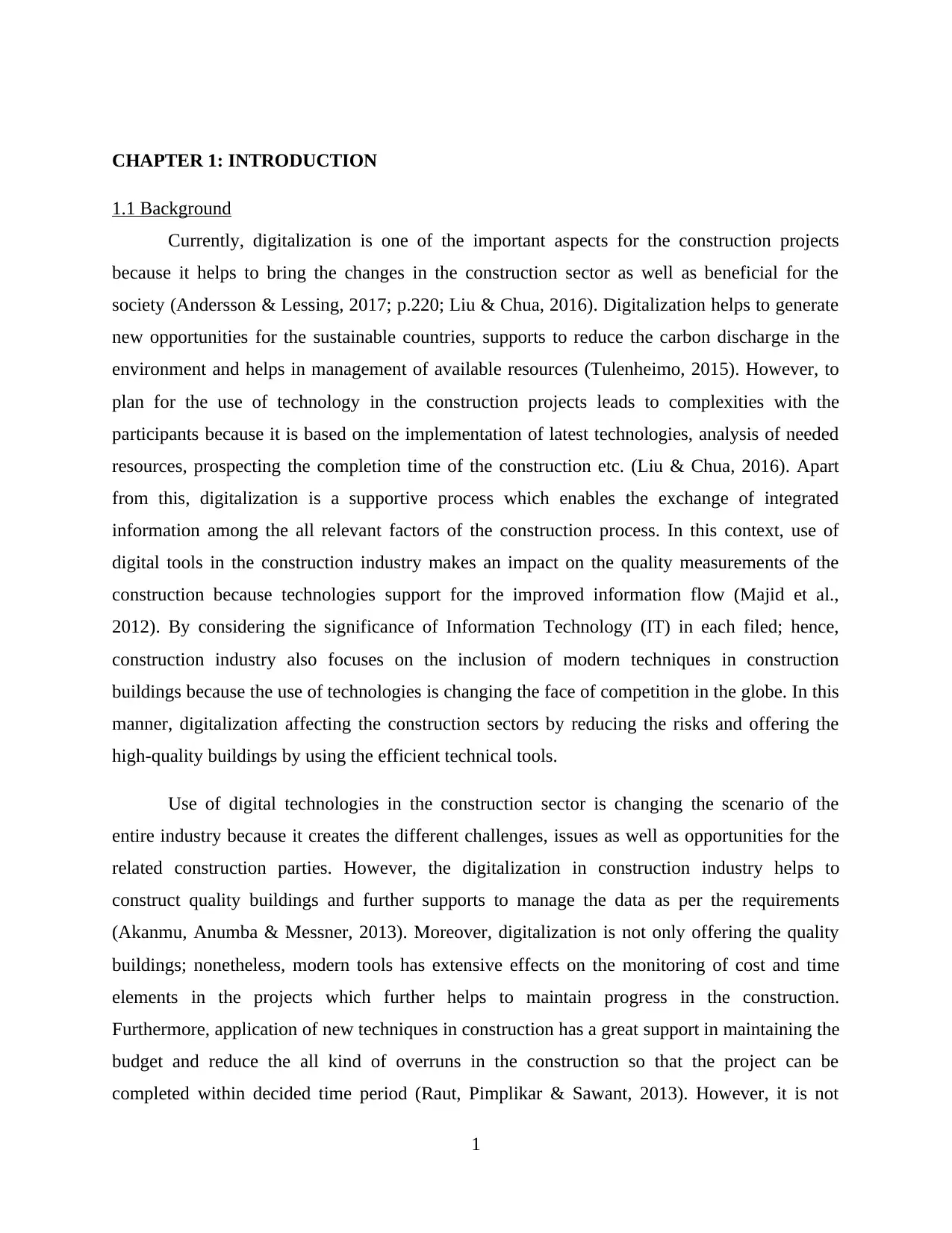
CHAPTER 1: INTRODUCTION
1.1 Background
Currently, digitalization is one of the important aspects for the construction projects
because it helps to bring the changes in the construction sector as well as beneficial for the
society (Andersson & Lessing, 2017; p.220; Liu & Chua, 2016). Digitalization helps to generate
new opportunities for the sustainable countries, supports to reduce the carbon discharge in the
environment and helps in management of available resources (Tulenheimo, 2015). However, to
plan for the use of technology in the construction projects leads to complexities with the
participants because it is based on the implementation of latest technologies, analysis of needed
resources, prospecting the completion time of the construction etc. (Liu & Chua, 2016). Apart
from this, digitalization is a supportive process which enables the exchange of integrated
information among the all relevant factors of the construction process. In this context, use of
digital tools in the construction industry makes an impact on the quality measurements of the
construction because technologies support for the improved information flow (Majid et al.,
2012). By considering the significance of Information Technology (IT) in each filed; hence,
construction industry also focuses on the inclusion of modern techniques in construction
buildings because the use of technologies is changing the face of competition in the globe. In this
manner, digitalization affecting the construction sectors by reducing the risks and offering the
high-quality buildings by using the efficient technical tools.
Use of digital technologies in the construction sector is changing the scenario of the
entire industry because it creates the different challenges, issues as well as opportunities for the
related construction parties. However, the digitalization in construction industry helps to
construct quality buildings and further supports to manage the data as per the requirements
(Akanmu, Anumba & Messner, 2013). Moreover, digitalization is not only offering the quality
buildings; nonetheless, modern tools has extensive effects on the monitoring of cost and time
elements in the projects which further helps to maintain progress in the construction.
Furthermore, application of new techniques in construction has a great support in maintaining the
budget and reduce the all kind of overruns in the construction so that the project can be
completed within decided time period (Raut, Pimplikar & Sawant, 2013). However, it is not
1
1.1 Background
Currently, digitalization is one of the important aspects for the construction projects
because it helps to bring the changes in the construction sector as well as beneficial for the
society (Andersson & Lessing, 2017; p.220; Liu & Chua, 2016). Digitalization helps to generate
new opportunities for the sustainable countries, supports to reduce the carbon discharge in the
environment and helps in management of available resources (Tulenheimo, 2015). However, to
plan for the use of technology in the construction projects leads to complexities with the
participants because it is based on the implementation of latest technologies, analysis of needed
resources, prospecting the completion time of the construction etc. (Liu & Chua, 2016). Apart
from this, digitalization is a supportive process which enables the exchange of integrated
information among the all relevant factors of the construction process. In this context, use of
digital tools in the construction industry makes an impact on the quality measurements of the
construction because technologies support for the improved information flow (Majid et al.,
2012). By considering the significance of Information Technology (IT) in each filed; hence,
construction industry also focuses on the inclusion of modern techniques in construction
buildings because the use of technologies is changing the face of competition in the globe. In this
manner, digitalization affecting the construction sectors by reducing the risks and offering the
high-quality buildings by using the efficient technical tools.
Use of digital technologies in the construction sector is changing the scenario of the
entire industry because it creates the different challenges, issues as well as opportunities for the
related construction parties. However, the digitalization in construction industry helps to
construct quality buildings and further supports to manage the data as per the requirements
(Akanmu, Anumba & Messner, 2013). Moreover, digitalization is not only offering the quality
buildings; nonetheless, modern tools has extensive effects on the monitoring of cost and time
elements in the projects which further helps to maintain progress in the construction.
Furthermore, application of new techniques in construction has a great support in maintaining the
budget and reduce the all kind of overruns in the construction so that the project can be
completed within decided time period (Raut, Pimplikar & Sawant, 2013). However, it is not
1
Paraphrase This Document
Need a fresh take? Get an instant paraphrase of this document with our AI Paraphraser
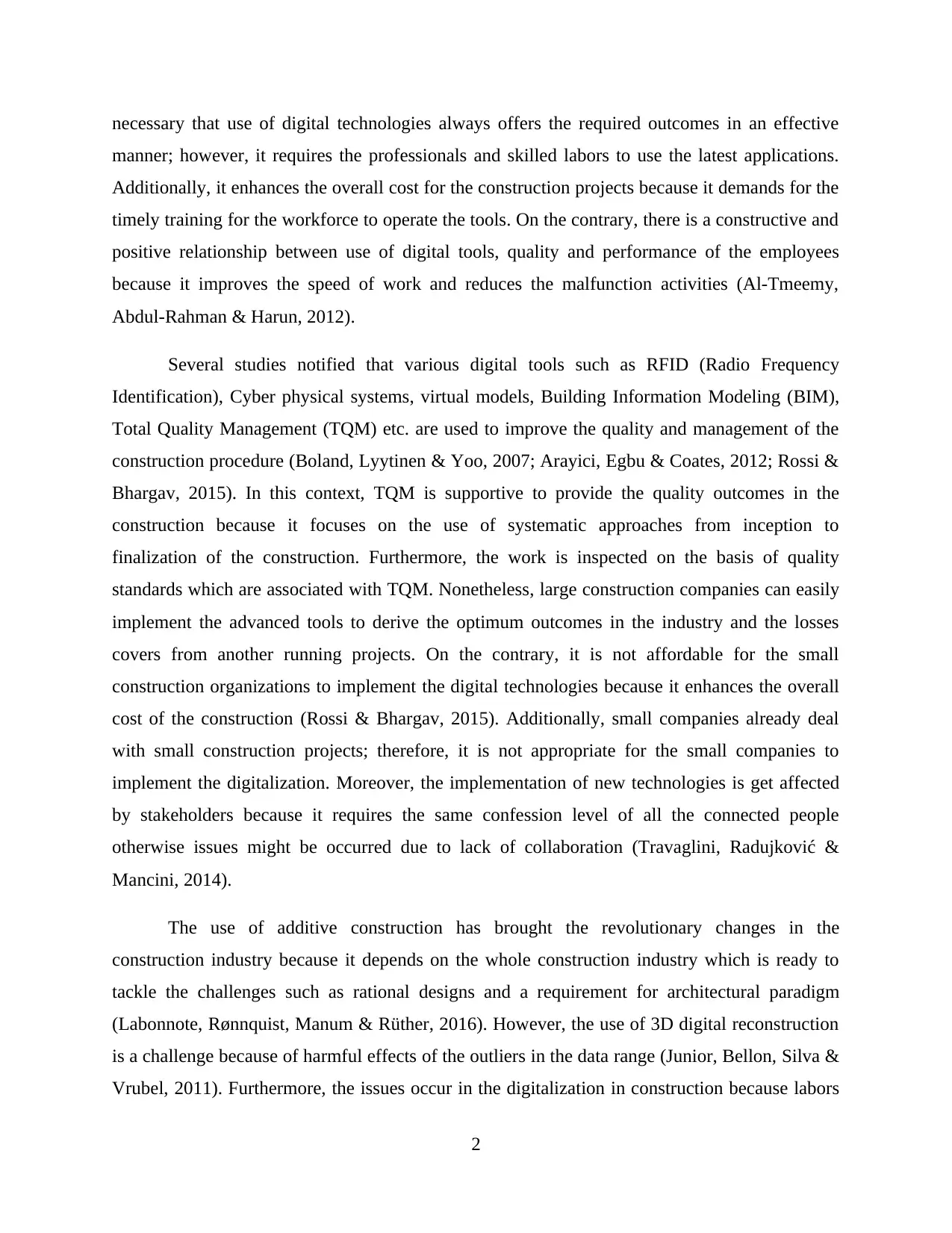
necessary that use of digital technologies always offers the required outcomes in an effective
manner; however, it requires the professionals and skilled labors to use the latest applications.
Additionally, it enhances the overall cost for the construction projects because it demands for the
timely training for the workforce to operate the tools. On the contrary, there is a constructive and
positive relationship between use of digital tools, quality and performance of the employees
because it improves the speed of work and reduces the malfunction activities (Al-Tmeemy,
Abdul-Rahman & Harun, 2012).
Several studies notified that various digital tools such as RFID (Radio Frequency
Identification), Cyber physical systems, virtual models, Building Information Modeling (BIM),
Total Quality Management (TQM) etc. are used to improve the quality and management of the
construction procedure (Boland, Lyytinen & Yoo, 2007; Arayici, Egbu & Coates, 2012; Rossi &
Bhargav, 2015). In this context, TQM is supportive to provide the quality outcomes in the
construction because it focuses on the use of systematic approaches from inception to
finalization of the construction. Furthermore, the work is inspected on the basis of quality
standards which are associated with TQM. Nonetheless, large construction companies can easily
implement the advanced tools to derive the optimum outcomes in the industry and the losses
covers from another running projects. On the contrary, it is not affordable for the small
construction organizations to implement the digital technologies because it enhances the overall
cost of the construction (Rossi & Bhargav, 2015). Additionally, small companies already deal
with small construction projects; therefore, it is not appropriate for the small companies to
implement the digitalization. Moreover, the implementation of new technologies is get affected
by stakeholders because it requires the same confession level of all the connected people
otherwise issues might be occurred due to lack of collaboration (Travaglini, Radujković &
Mancini, 2014).
The use of additive construction has brought the revolutionary changes in the
construction industry because it depends on the whole construction industry which is ready to
tackle the challenges such as rational designs and a requirement for architectural paradigm
(Labonnote, Rønnquist, Manum & Rüther, 2016). However, the use of 3D digital reconstruction
is a challenge because of harmful effects of the outliers in the data range (Junior, Bellon, Silva &
Vrubel, 2011). Furthermore, the issues occur in the digitalization in construction because labors
2
manner; however, it requires the professionals and skilled labors to use the latest applications.
Additionally, it enhances the overall cost for the construction projects because it demands for the
timely training for the workforce to operate the tools. On the contrary, there is a constructive and
positive relationship between use of digital tools, quality and performance of the employees
because it improves the speed of work and reduces the malfunction activities (Al-Tmeemy,
Abdul-Rahman & Harun, 2012).
Several studies notified that various digital tools such as RFID (Radio Frequency
Identification), Cyber physical systems, virtual models, Building Information Modeling (BIM),
Total Quality Management (TQM) etc. are used to improve the quality and management of the
construction procedure (Boland, Lyytinen & Yoo, 2007; Arayici, Egbu & Coates, 2012; Rossi &
Bhargav, 2015). In this context, TQM is supportive to provide the quality outcomes in the
construction because it focuses on the use of systematic approaches from inception to
finalization of the construction. Furthermore, the work is inspected on the basis of quality
standards which are associated with TQM. Nonetheless, large construction companies can easily
implement the advanced tools to derive the optimum outcomes in the industry and the losses
covers from another running projects. On the contrary, it is not affordable for the small
construction organizations to implement the digital technologies because it enhances the overall
cost of the construction (Rossi & Bhargav, 2015). Additionally, small companies already deal
with small construction projects; therefore, it is not appropriate for the small companies to
implement the digitalization. Moreover, the implementation of new technologies is get affected
by stakeholders because it requires the same confession level of all the connected people
otherwise issues might be occurred due to lack of collaboration (Travaglini, Radujković &
Mancini, 2014).
The use of additive construction has brought the revolutionary changes in the
construction industry because it depends on the whole construction industry which is ready to
tackle the challenges such as rational designs and a requirement for architectural paradigm
(Labonnote, Rønnquist, Manum & Rüther, 2016). However, the use of 3D digital reconstruction
is a challenge because of harmful effects of the outliers in the data range (Junior, Bellon, Silva &
Vrubel, 2011). Furthermore, the issues occur in the digitalization in construction because labors
2
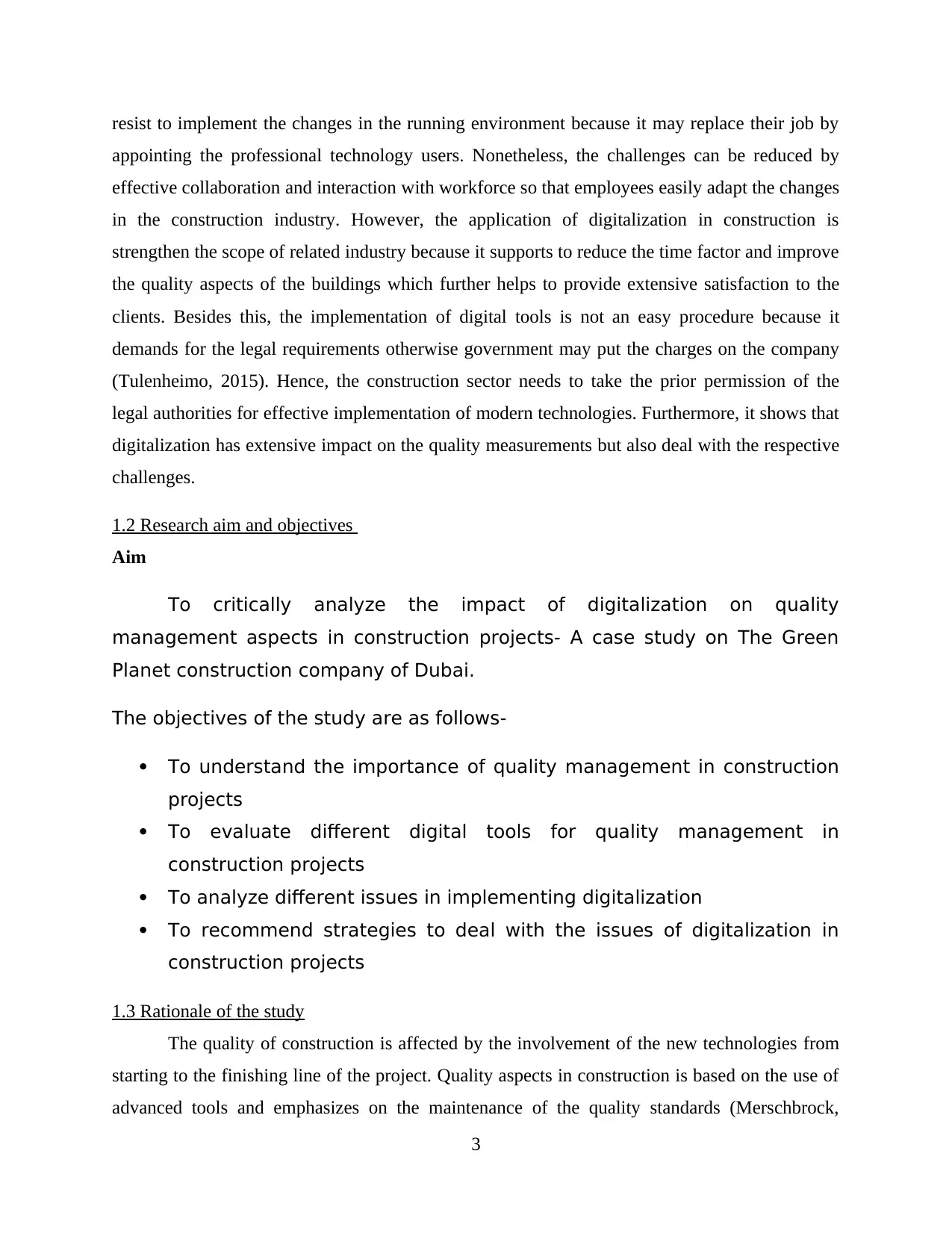
resist to implement the changes in the running environment because it may replace their job by
appointing the professional technology users. Nonetheless, the challenges can be reduced by
effective collaboration and interaction with workforce so that employees easily adapt the changes
in the construction industry. However, the application of digitalization in construction is
strengthen the scope of related industry because it supports to reduce the time factor and improve
the quality aspects of the buildings which further helps to provide extensive satisfaction to the
clients. Besides this, the implementation of digital tools is not an easy procedure because it
demands for the legal requirements otherwise government may put the charges on the company
(Tulenheimo, 2015). Hence, the construction sector needs to take the prior permission of the
legal authorities for effective implementation of modern technologies. Furthermore, it shows that
digitalization has extensive impact on the quality measurements but also deal with the respective
challenges.
1.2 Research aim and objectives
Aim
To critically analyze the impact of digitalization on quality
management aspects in construction projects- A case study on The Green
Planet construction company of Dubai.
The objectives of the study are as follows-
To understand the importance of quality management in construction
projects
To evaluate different digital tools for quality management in
construction projects
To analyze different issues in implementing digitalization
To recommend strategies to deal with the issues of digitalization in
construction projects
1.3 Rationale of the study
The quality of construction is affected by the involvement of the new technologies from
starting to the finishing line of the project. Quality aspects in construction is based on the use of
advanced tools and emphasizes on the maintenance of the quality standards (Merschbrock,
3
appointing the professional technology users. Nonetheless, the challenges can be reduced by
effective collaboration and interaction with workforce so that employees easily adapt the changes
in the construction industry. However, the application of digitalization in construction is
strengthen the scope of related industry because it supports to reduce the time factor and improve
the quality aspects of the buildings which further helps to provide extensive satisfaction to the
clients. Besides this, the implementation of digital tools is not an easy procedure because it
demands for the legal requirements otherwise government may put the charges on the company
(Tulenheimo, 2015). Hence, the construction sector needs to take the prior permission of the
legal authorities for effective implementation of modern technologies. Furthermore, it shows that
digitalization has extensive impact on the quality measurements but also deal with the respective
challenges.
1.2 Research aim and objectives
Aim
To critically analyze the impact of digitalization on quality
management aspects in construction projects- A case study on The Green
Planet construction company of Dubai.
The objectives of the study are as follows-
To understand the importance of quality management in construction
projects
To evaluate different digital tools for quality management in
construction projects
To analyze different issues in implementing digitalization
To recommend strategies to deal with the issues of digitalization in
construction projects
1.3 Rationale of the study
The quality of construction is affected by the involvement of the new technologies from
starting to the finishing line of the project. Quality aspects in construction is based on the use of
advanced tools and emphasizes on the maintenance of the quality standards (Merschbrock,
3
⊘ This is a preview!⊘
Do you want full access?
Subscribe today to unlock all pages.

Trusted by 1+ million students worldwide
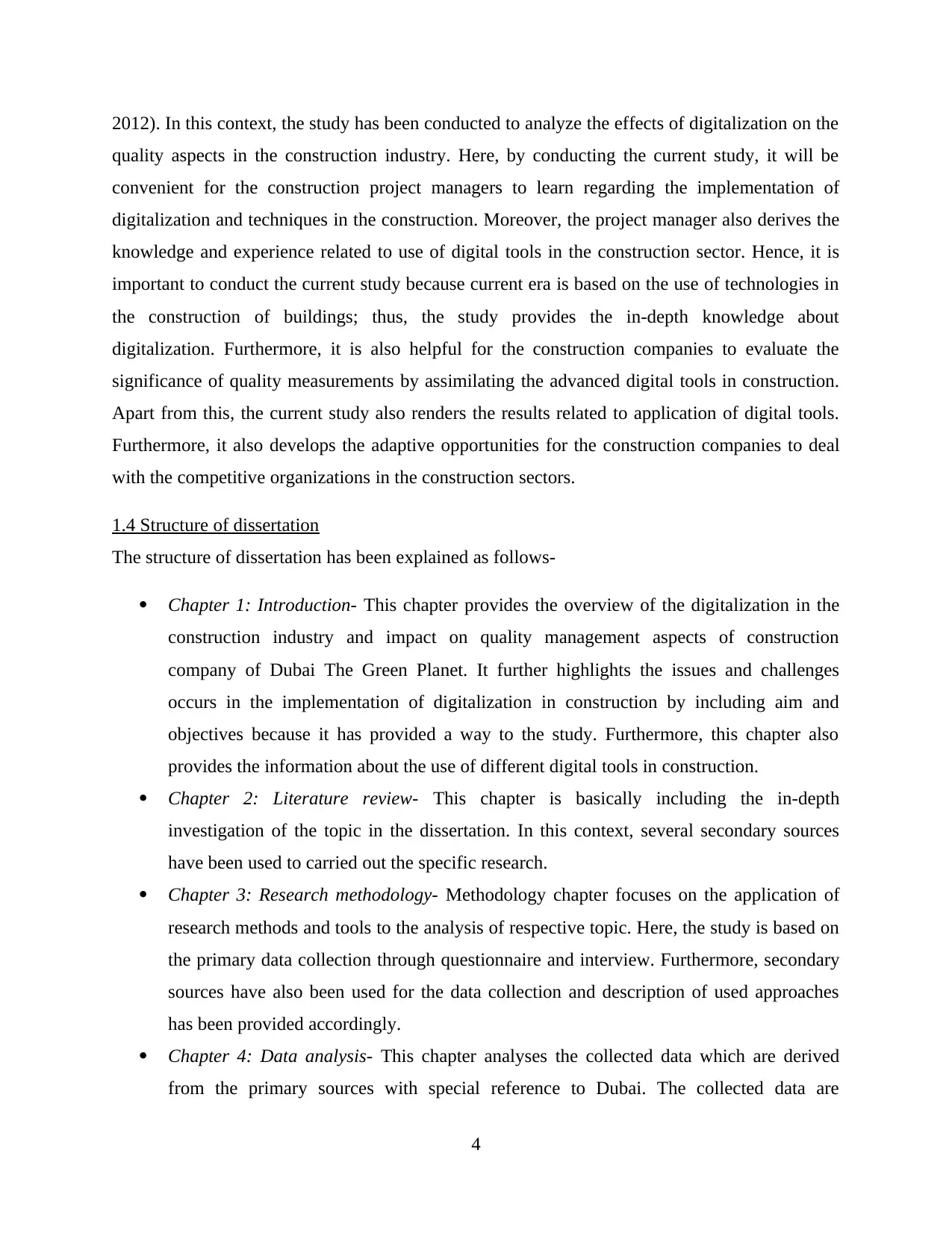
2012). In this context, the study has been conducted to analyze the effects of digitalization on the
quality aspects in the construction industry. Here, by conducting the current study, it will be
convenient for the construction project managers to learn regarding the implementation of
digitalization and techniques in the construction. Moreover, the project manager also derives the
knowledge and experience related to use of digital tools in the construction sector. Hence, it is
important to conduct the current study because current era is based on the use of technologies in
the construction of buildings; thus, the study provides the in-depth knowledge about
digitalization. Furthermore, it is also helpful for the construction companies to evaluate the
significance of quality measurements by assimilating the advanced digital tools in construction.
Apart from this, the current study also renders the results related to application of digital tools.
Furthermore, it also develops the adaptive opportunities for the construction companies to deal
with the competitive organizations in the construction sectors.
1.4 Structure of dissertation
The structure of dissertation has been explained as follows-
Chapter 1: Introduction- This chapter provides the overview of the digitalization in the
construction industry and impact on quality management aspects of construction
company of Dubai The Green Planet. It further highlights the issues and challenges
occurs in the implementation of digitalization in construction by including aim and
objectives because it has provided a way to the study. Furthermore, this chapter also
provides the information about the use of different digital tools in construction.
Chapter 2: Literature review- This chapter is basically including the in-depth
investigation of the topic in the dissertation. In this context, several secondary sources
have been used to carried out the specific research.
Chapter 3: Research methodology- Methodology chapter focuses on the application of
research methods and tools to the analysis of respective topic. Here, the study is based on
the primary data collection through questionnaire and interview. Furthermore, secondary
sources have also been used for the data collection and description of used approaches
has been provided accordingly.
Chapter 4: Data analysis- This chapter analyses the collected data which are derived
from the primary sources with special reference to Dubai. The collected data are
4
quality aspects in the construction industry. Here, by conducting the current study, it will be
convenient for the construction project managers to learn regarding the implementation of
digitalization and techniques in the construction. Moreover, the project manager also derives the
knowledge and experience related to use of digital tools in the construction sector. Hence, it is
important to conduct the current study because current era is based on the use of technologies in
the construction of buildings; thus, the study provides the in-depth knowledge about
digitalization. Furthermore, it is also helpful for the construction companies to evaluate the
significance of quality measurements by assimilating the advanced digital tools in construction.
Apart from this, the current study also renders the results related to application of digital tools.
Furthermore, it also develops the adaptive opportunities for the construction companies to deal
with the competitive organizations in the construction sectors.
1.4 Structure of dissertation
The structure of dissertation has been explained as follows-
Chapter 1: Introduction- This chapter provides the overview of the digitalization in the
construction industry and impact on quality management aspects of construction
company of Dubai The Green Planet. It further highlights the issues and challenges
occurs in the implementation of digitalization in construction by including aim and
objectives because it has provided a way to the study. Furthermore, this chapter also
provides the information about the use of different digital tools in construction.
Chapter 2: Literature review- This chapter is basically including the in-depth
investigation of the topic in the dissertation. In this context, several secondary sources
have been used to carried out the specific research.
Chapter 3: Research methodology- Methodology chapter focuses on the application of
research methods and tools to the analysis of respective topic. Here, the study is based on
the primary data collection through questionnaire and interview. Furthermore, secondary
sources have also been used for the data collection and description of used approaches
has been provided accordingly.
Chapter 4: Data analysis- This chapter analyses the collected data which are derived
from the primary sources with special reference to Dubai. The collected data are
4
Paraphrase This Document
Need a fresh take? Get an instant paraphrase of this document with our AI Paraphraser
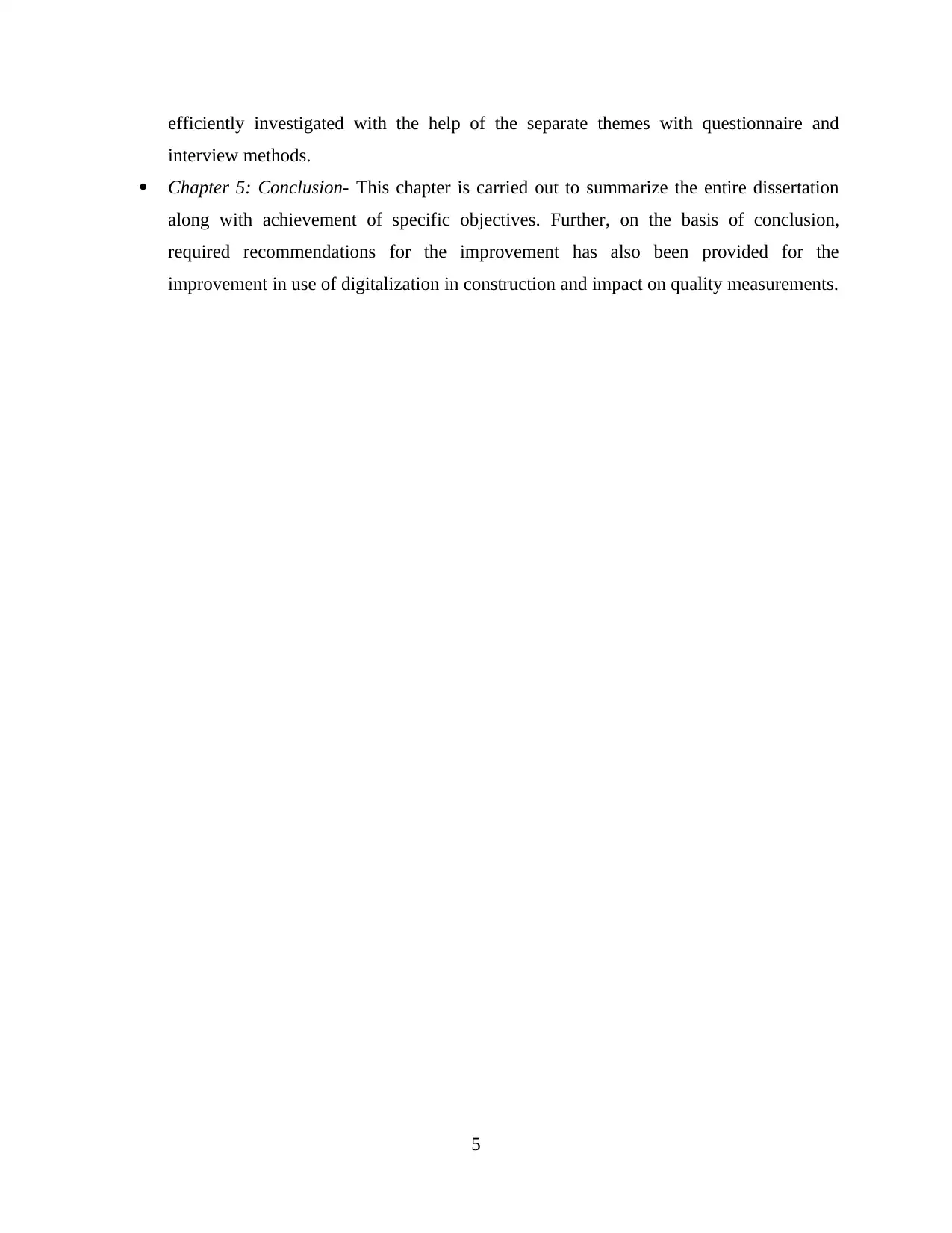
efficiently investigated with the help of the separate themes with questionnaire and
interview methods.
Chapter 5: Conclusion- This chapter is carried out to summarize the entire dissertation
along with achievement of specific objectives. Further, on the basis of conclusion,
required recommendations for the improvement has also been provided for the
improvement in use of digitalization in construction and impact on quality measurements.
5
interview methods.
Chapter 5: Conclusion- This chapter is carried out to summarize the entire dissertation
along with achievement of specific objectives. Further, on the basis of conclusion,
required recommendations for the improvement has also been provided for the
improvement in use of digitalization in construction and impact on quality measurements.
5
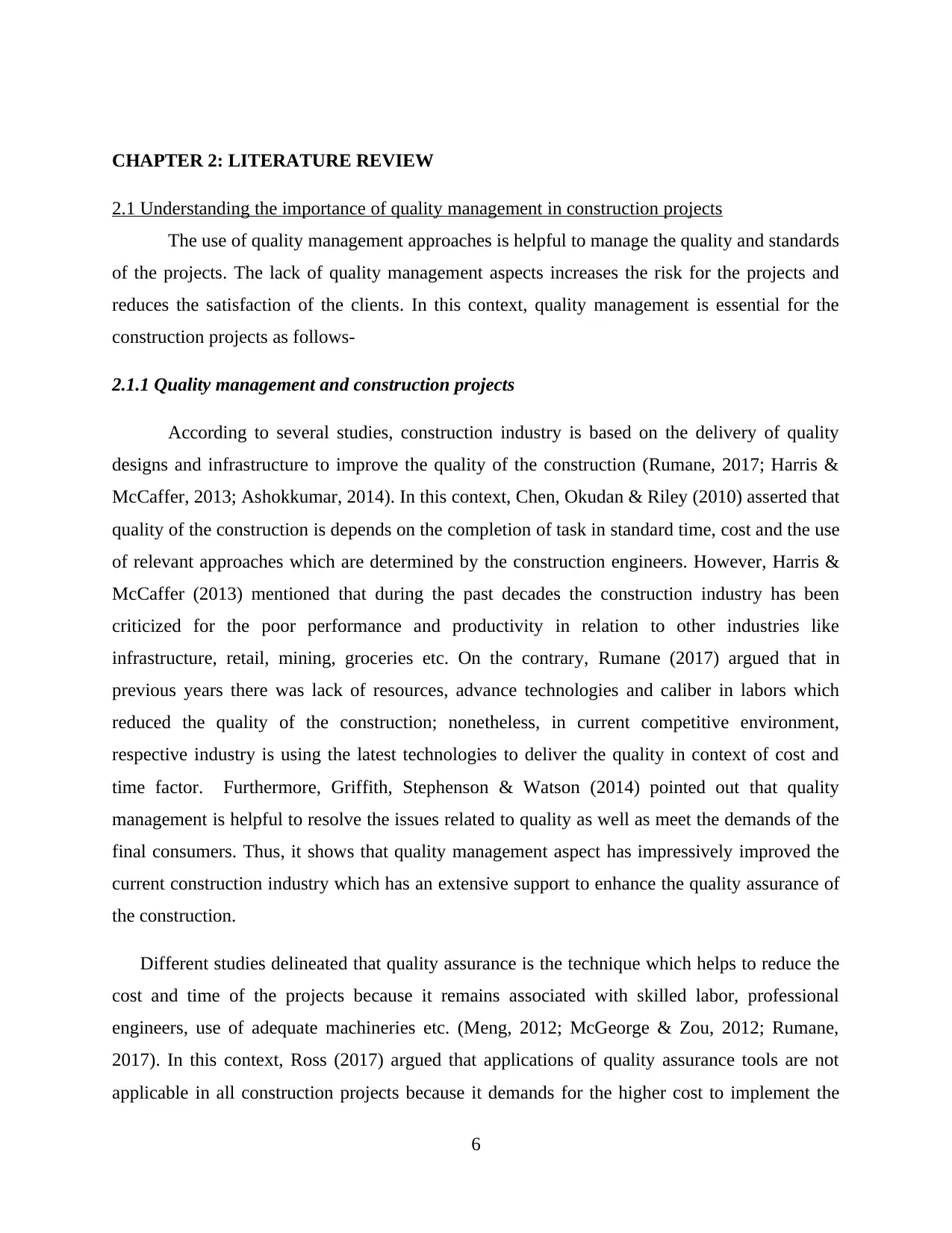
CHAPTER 2: LITERATURE REVIEW
2.1 Understanding the importance of quality management in construction projects
The use of quality management approaches is helpful to manage the quality and standards
of the projects. The lack of quality management aspects increases the risk for the projects and
reduces the satisfaction of the clients. In this context, quality management is essential for the
construction projects as follows-
2.1.1 Quality management and construction projects
According to several studies, construction industry is based on the delivery of quality
designs and infrastructure to improve the quality of the construction (Rumane, 2017; Harris &
McCaffer, 2013; Ashokkumar, 2014). In this context, Chen, Okudan & Riley (2010) asserted that
quality of the construction is depends on the completion of task in standard time, cost and the use
of relevant approaches which are determined by the construction engineers. However, Harris &
McCaffer (2013) mentioned that during the past decades the construction industry has been
criticized for the poor performance and productivity in relation to other industries like
infrastructure, retail, mining, groceries etc. On the contrary, Rumane (2017) argued that in
previous years there was lack of resources, advance technologies and caliber in labors which
reduced the quality of the construction; nonetheless, in current competitive environment,
respective industry is using the latest technologies to deliver the quality in context of cost and
time factor. Furthermore, Griffith, Stephenson & Watson (2014) pointed out that quality
management is helpful to resolve the issues related to quality as well as meet the demands of the
final consumers. Thus, it shows that quality management aspect has impressively improved the
current construction industry which has an extensive support to enhance the quality assurance of
the construction.
Different studies delineated that quality assurance is the technique which helps to reduce the
cost and time of the projects because it remains associated with skilled labor, professional
engineers, use of adequate machineries etc. (Meng, 2012; McGeorge & Zou, 2012; Rumane,
2017). In this context, Ross (2017) argued that applications of quality assurance tools are not
applicable in all construction projects because it demands for the higher cost to implement the
6
2.1 Understanding the importance of quality management in construction projects
The use of quality management approaches is helpful to manage the quality and standards
of the projects. The lack of quality management aspects increases the risk for the projects and
reduces the satisfaction of the clients. In this context, quality management is essential for the
construction projects as follows-
2.1.1 Quality management and construction projects
According to several studies, construction industry is based on the delivery of quality
designs and infrastructure to improve the quality of the construction (Rumane, 2017; Harris &
McCaffer, 2013; Ashokkumar, 2014). In this context, Chen, Okudan & Riley (2010) asserted that
quality of the construction is depends on the completion of task in standard time, cost and the use
of relevant approaches which are determined by the construction engineers. However, Harris &
McCaffer (2013) mentioned that during the past decades the construction industry has been
criticized for the poor performance and productivity in relation to other industries like
infrastructure, retail, mining, groceries etc. On the contrary, Rumane (2017) argued that in
previous years there was lack of resources, advance technologies and caliber in labors which
reduced the quality of the construction; nonetheless, in current competitive environment,
respective industry is using the latest technologies to deliver the quality in context of cost and
time factor. Furthermore, Griffith, Stephenson & Watson (2014) pointed out that quality
management is helpful to resolve the issues related to quality as well as meet the demands of the
final consumers. Thus, it shows that quality management aspect has impressively improved the
current construction industry which has an extensive support to enhance the quality assurance of
the construction.
Different studies delineated that quality assurance is the technique which helps to reduce the
cost and time of the projects because it remains associated with skilled labor, professional
engineers, use of adequate machineries etc. (Meng, 2012; McGeorge & Zou, 2012; Rumane,
2017). In this context, Ross (2017) argued that applications of quality assurance tools are not
applicable in all construction projects because it demands for the higher cost to implement the
6
⊘ This is a preview!⊘
Do you want full access?
Subscribe today to unlock all pages.

Trusted by 1+ million students worldwide
1 out of 63
Related Documents
Your All-in-One AI-Powered Toolkit for Academic Success.
+13062052269
info@desklib.com
Available 24*7 on WhatsApp / Email
![[object Object]](/_next/static/media/star-bottom.7253800d.svg)
Unlock your academic potential
Copyright © 2020–2026 A2Z Services. All Rights Reserved. Developed and managed by ZUCOL.





